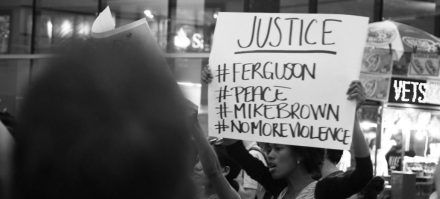UN Human Rights Council takes action to tackle racism and police brutality

George Floyd’s killing in the United States city of Minneapolis in Minnesota has shed light on systemic racism within law enforcement agencies across the US. Such discrimination is a global problem, as we have documented in Global Prison Trends 2020, minority groups are over-represented in many criminal justice systems, seeing higher rates of arrest, pre-trial detention and prison sentences. In reaction to the calls for action internationally, the United Nations Human Rights Council today addressed such discrimination and racism against Africans and People of African Descent by actors of criminal justice.
Following an urgent debate at the Human Rights Council to discuss ‘current racially inspired human rights violations, systemic racism, police brutality against Africans and people of African descent, and violence against peaceful protestors’, the Council adopted a resolution presented by Burkina Faso on behalf of African states.
‘Through its resolution, the Human Rights Council sends an explicit message that racism and excessive use of force by any actor of criminal justice agencies, including law enforcement, needs to be tackled’, commented Olivia Rope, Director of Policy and International Advocacy at Penal Reform International (PRI).
The Council condemned systemic racism, excessive use of force and other human rights violations by law enforcement against Africans and people of African descent. Significantly, it mandated the UN High Commissioner for Human Rights to provide oral reports on this issue and requested a written report in one year.
Law enforcement officers, or police, are a central actor in the criminal justice chain and the actors which people are often the most familiar with as they come into contact with them and can see them regularly in daily life; much more familiar than a prosecutor, a judge, or a parole /probation officer for example. Typically, the respect of procedural rights for suspects starts upon arrest. In this sense, police are essential in building a fair and effective criminal justice and in creating trust in the system. The presumption of innocence starts with the police. The events unfolding globally since the killing of George Floyd confirm that in too many places on the planet the police is not trusted as a fair and respectful criminal justice actor.
‘It is of upmost importance that the Human Rights Council looks at discrimination and police brutality with a global lens,’ explained Rope. ‘Misconduct, violence and brutality exist in many police forces around the world, obstructing fair and effective justice for many people, and hindering public trust’.
This timely and concrete action by the Human Rights Council is an important call for the UN, and especially human rights bodies, to give greater attention the harm and violations suffered by many people who come into contact with criminal justice systems. ‘George Floyd’s death must lead to the United Nations’ human rights mechanisms paying more attention to rights violations within criminal justice systems worldwide’, Rope also said.
This timely and concrete action by the Human Rights Council is an important call for the UN, and especially human rights bodies, to give greater attention the harm and violations suffered by many people who come into contact with criminal justice systems.
Penal Reform International is highly experienced in working with law enforcement in many countries in Africa, Central Asia and the Middle East, and creating conditions for a human rights based approach by criminal justice actors. Where racism and xenophobia are at the heart of police misconduct incidents, violence and brutality, such behaviour is also is a consequence of an organisational culture within law enforcement where it is common to ‘close ranks’ as a uniformed body and protect each other, rather than as accountability towards peers and superiors. ‘As in many uniformed services, this strong sense of solidarity can weaken the ability to hold each other accountable, which we see with law enforcement officers and prison officers’, commented Rope. ‘Today’s resolution at the Human Rights Council must hence be the start of a long-term commitment to shift the mindset and culture of law enforcement in many countries’.
Governments, the international community and civil society need to work together to heed the call that #BlackLivesMatter through long-term, holistic and systemic reform that has human rights at its core. ‘With this resolution, the United Nations is equipped to lead the way, provide practical recommendations, and support states willing to reform their police whilst holding those lacking national reform and internal accountability mechanisms accountable’, concluded Rope.